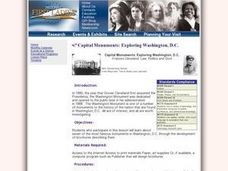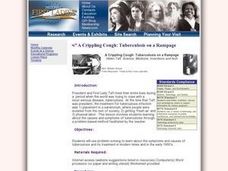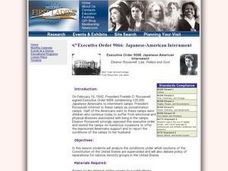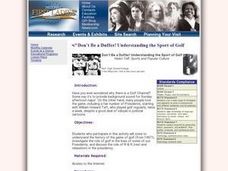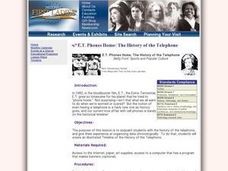National First Ladies' Library
The History of Jim Crow: Legal Racism in America
Students study the history and culture of Jim Crow, as well as the scope of Jim Crow laws across the United States. They consider the concepts of terror and triumph with respect to the history of Jim Crow, the recognition of evidence of...
National First Ladies' Library
Capital Monuments: Exploring Washington, DC Frances Cleveland: Law, Politics and Government
Students, working in small groups, research seven of the most famous monuments found in Washington, DC. They design brochures based on the information they gather from Internet and print resources. Upon completion, they share the...
National First Ladies' Library
Impeachment!
Young scholars investigate the impeachment proceedings against Andrew Johnson, Richard Nixon, and William Clinton. In small groups they conduct Internet research on one of the three Presidents, and present a "brief" on the case,...
National First Ladies' Library
Terrorism and Tolerance
Learners define the concepts of terrorism and tolerance using various resources. They examine the concept of stereotype, consider stereotypes often applied to Arabs, Middle Easterners, and Muslims, and attempt to discredit these...
National First Ladies' Library
Forming a League of Nations
Students identify and research the original language as composed by Woodrow Wilson in his League of Nations. Then they identify and describe the revisions of the original League of Nations as the United Nations was created. Students also...
National First Ladies' Library
Safety or Civil Liberty? The Trial of Sacco and Vanzet
Students investigate the Sacco-Vanzetti trial and develop a basic understanding of the issues involved. Then they write an essay taking a stance on the Sacco-Vanzetti trial: was the trial fair? were the two men falsely accused? Finally,...
National First Ladies' Library
How a Bill Becomes a Law
High schoolers engage in the democratic process and to learn how a bill become a law. Then they write a bill they would like as law in their classroom. Young scholars also form committees that will review the list of bills to determine...
National First Ladies' Library
Secretary of Commerce
Middle schoolers gain understanding of economic history of United States in twentieth century by examining role of Department of Commerce. Student groups each analyze one quarter of twentieth century by researching role of Department of...
National First Ladies' Library
A Crippling Cough: Tuberculosis on a Rampage
Students use problem solving skills to examine symptoms, causes, and treatment of tuberculosis in modern times and in early 1900s. Students read patient case, work in teams to diagnose illness, and conduct Internet research to confirm...
National First Ladies' Library
Executive Order 9066: Japanese-American Internment
Students analyze conditions under which sections of United States Constitution are superceded, research history of Native Americans, African Americans, and Japanese Americans, and debate policy of reparations for various minority groups...
National First Ladies' Library
Mrs. Wilson's Alley Bill
Learners read and understand Ellen Wilson's bill. They review the federal law-making procedure and understand the implications of an appropriation bill to redress housing concerns during a time of looming war. Classmates are split into...
National First Ladies' Library
Will Rogers
Learners explore the concepts of irony and humor. They discuss Will Rogers' history and determine that he was a humorist who many viewed as very wise. They read quotes of Will Rogers and determine that everybody is ignorant, only on...
National First Ladies' Library
The Sport of Kings: Horse Racing in America
Pupils examine the history of horse racing. They discuss their experiences with horse racing and conduct Internet research. They select a topic related to the history of horse racing, write and present a report, and read and summarize a...
National First Ladies' Library
Don't Be a Duffer! Understanding the Sport of Golf
Students are divided into six groups to access the "History of Golf Since 1497" website, and familiarize themselves with the data on one of the six pages of the website. They then work together as a large group to construct a timeline of...
National First Ladies' Library
Ragtime: The First "American" Music?
Learners investigate the concept of ragtime music and the times associated with it in American history. They conduct research using a variety of resources and listen to a sample before writing down some of the results of the information...
National First Ladies' Library
Let's Make a World Series Almanac
Middle schoolers discuss the meaning of the word, almanac and then decide which statistics about the World Series they think should be included in the almanac, browsing some websites to get some idea of what statistics are available....
National First Ladies' Library
Designing an Appalachian Folk Art Museum
Learners investigate the concepts related to the Appalachian area and the movement of Folk Art. They conduct research using a variety of resources and use the samples as inspiration for creating their own works of art. They could...
National First Ladies' Library
Gibson Girls and Flappers: What is this "New Woman"?
Students divide into five groups with each exploring one section of the website, "The New Woman". After they complete their research, they discuss the nature and characteristics of the "new woman" and compare these to characteristics of...
National First Ladies' Library
Social Studies: Who Burned Down Barnum's Museum?
Learners examine the social conflict of the 19th century and the destruction of the American Museum. In pairs, they conduct Internet research and attempt to solve the mystery of who burned down the museum. Clues to the mystery are found...
National First Ladies' Library
E.T. Phones Home: The History of the Telephone
Students create illustrated timelines of the telephone's history. In groups, they research 25-year sections beginning in 1876. Once each group has completed their portion of the timeline, they are all assembled to create one banner.
National First Ladies' Library
Michigan vs. Ohio State: A Serious Rivalry!
Middle schoolers discuss and research the pros and cons of school rivalries. In particular, they study the Michigan-Ohio State rivalry. Through their research, they think about how media accounts of college football games can be shaped...
National First Ladies' Library
Who’s on First? in the End Zone? at the net? in the Ring?
Pupils are introduced to some sport heroes from the 20th century. They are told that although many sports have their own Halls of Fame, there is no one list of the top 10 athletes from the 20th century. It is their job to research famous...
National First Ladies' Library
Slavery in the Beginning: Creating a Virtual Museum
Social studies learners explore slavery in the American colonies from 1607 to the Revolutionary War. In groups, they explore a PBS website and a virtual museum. Using these websites and other online resources, young scholars create their...
National First Ladies' Library
'Tis a Gift to Be Simple: The Shaker People
Students identify the difficulties and benefits of a utopian community. They examine their own ideas of utopia and research an example of one such community that has had an impact on our own culture.



